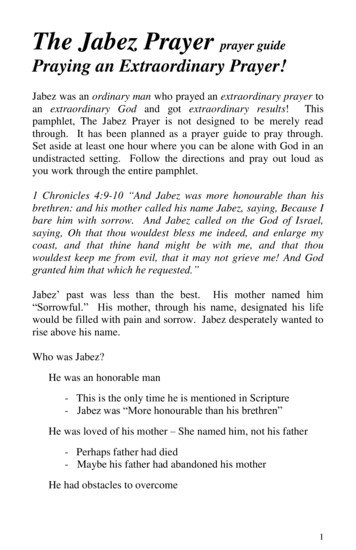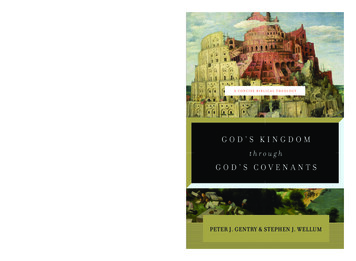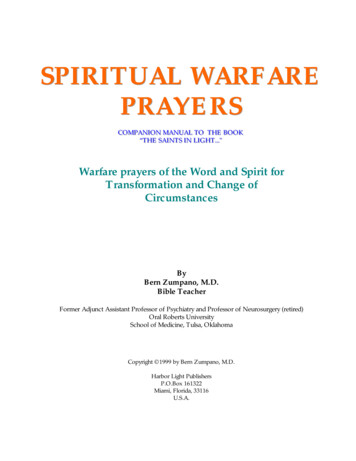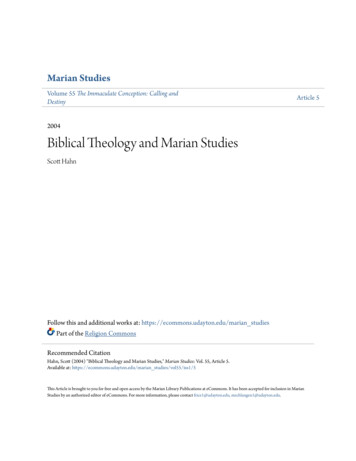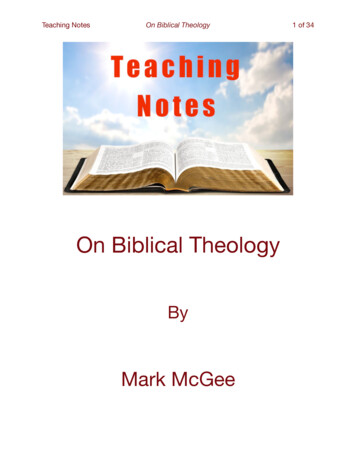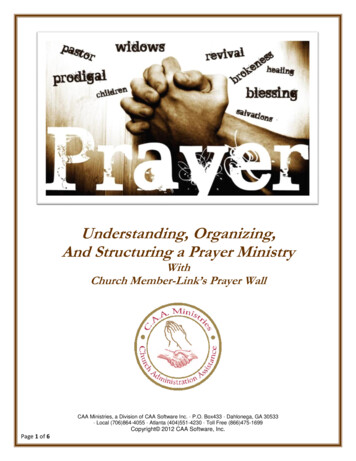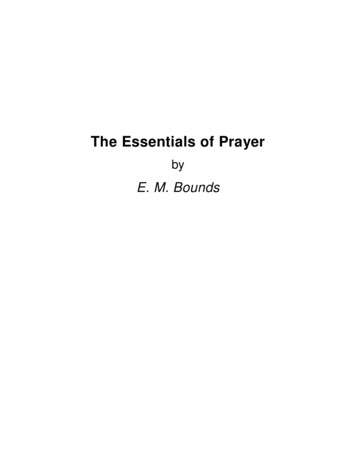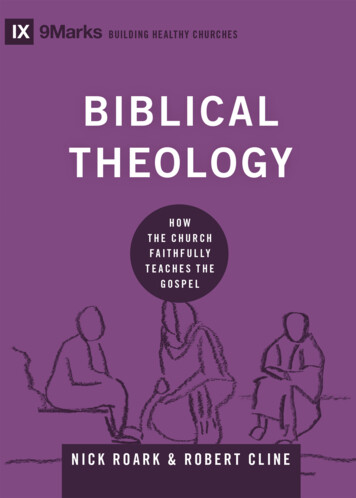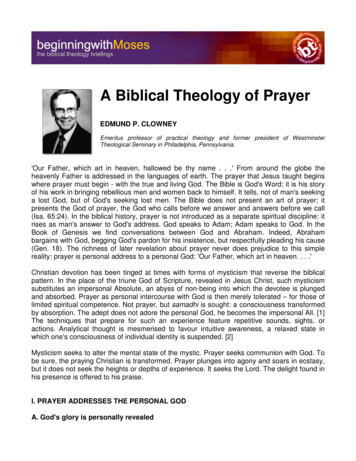
Transcription
A Biblical Theology of PrayerEDMUND P. CLOWNEYEmeritus professor of practical theology and former president of WestminsterTheological Seminary in Philadelphia, Pennsylvania.'Our Father, which art in heaven, hallowed be thy name . . .' From around the globe theheavenly Father is addressed in the languages of earth. The prayer that Jesus taught beginswhere prayer must begin - with the true and living God. The Bible is God's Word; it is his storyof his work in bringing rebellious men and women back to himself. It tells, not of man's seekinga lost God, but of God's seeking lost men. The Bible does not present an art of prayer; itpresents the God of prayer, the God who calls before we answer and answers before we call(Isa. 65:24). In the biblical history, prayer is not introduced as a separate spiritual discipline: itrises as man's answer to God's address. God speaks to Adam; Adam speaks to God. In theBook of Genesis we find conversations between God and Abraham. Indeed, Abrahambargains with God, begging God's pardon for his insistence, but respectfully pleading his cause(Gen. 18). The richness of later revelation about prayer never does prejudice to this simplereality: prayer is personal address to a personal God: 'Our Father, which art in heaven. . . .'Christian devotion has been tinged at times with forms of mysticism that reverse the biblicalpattern. In the place of the triune God of Scripture, revealed in Jesus Christ, such mysticismsubstitutes an impersonal Absolute, an abyss of non-being into which the devotee is plungedand absorbed. Prayer as personal intercourse with God is then merely tolerated – for those oflimited spiritual competence. Not prayer, but samadhi is sought: a consciousness transformedby absorption. The adept does not adore the personal God, he becomes the impersonal All. [1]The techniques that prepare for such an experience feature repetitive sounds, sights, oractions. Analytical thought is mesmerised to favour intuitive awareness, a relaxed state inwhich one's consciousness of individual identity is suspended. [2]Mysticism seeks to alter the mental state of the mystic. Prayer seeks communion with God. Tobe sure, the praying Christian is transformed. Prayer plunges into agony and soars in ecstasy,but it does not seek the heights or depths of experience. It seeks the Lord. The delight found inhis presence is offered to his praise.I. PRAYER ADDRESSES THE PERSONAL GODA. God's glory is personally revealed
Prayer, like all worship, is always a response to God's revelation of himself and his will. To callupon God's name one must first know his name; it is God who takes the initiative by makinghis name known. God reveals himself by his deeds; he also makes his name known directly byhis words. In both, God is revealed as personal. In his words he both promises and proclaimshis deeds. The wonder of both his words and his deeds evokes the response of adoration.1. In his worksGod reveals his power and wisdom in the created universe. 'The heavens declare the glory ofGod; the skies proclaim the work of his hands' (Ps. 19:1). Creation itself forms part of God'saddress to man. Psalm 147 beautifully joins the word of God that spreads the snow with theword that reveals his laws and decrees to Israel. Yet the God who speaks to his people isexalted above his creation, the work of his hands (Ps. 57:5). The thunder of God's power increation affects the response of prayer in a double way. First, because God has all power, heis able to act in answering prayer. The thunderstorm of God's appearing described in Psalm 18is his response to the cry of his afflicted servant. Second, the creative power of God shows theawe and reverence with which he is to be addressed and worshipped. God is not submerged inthe cosmos, but greater far than all that his word called into being. We may not find a visit tothe zoo a devotional experience, but God brought awe to Job with a close-up look at thehippopotamus and the crocodile. Job learned that his complaints had been addressed to aCreator whose power and wisdom surpass all understanding (Job 40,41).God's royal power appears in his control of history as well as of nature. 'The LORD foils theplans of the nations; he thwarts the purposes of the peoples. But the plans of the LORD standfast forever, the purposes of his heart through all generations' (Ps. 33:10,11).The prophet Elisha prayed that God would open the eyes of his servant to see the chariots offire that surrounded the besieging troops of Syria (2 Kgs. 6:17). Those who oppose thepurposes of God are always outnumbered and overpowered. The prophet can pray withconfidence to God as the Lord of history, and can proceed to capture those sent to take himcaptive.The deeds of God that both invite and answer prayer are, above all, his deeds of deliveranceand salvation. God hears the cry of enslaved and oppressed Israel, and declares to Moses inthe desert that he has come down to deliver them and bring them to himself (Exod. 3:7,9). Theexodus deliverance is God's answer ot the groans of his chosen people. Yet here, too, God'sanswer both exceeds and precedes their prayer. Enslaved Israel is far from praying effectivelyfor deliverance: the cry that comes to God is more the groan of affliction than the plea of faith.Moses, embittered by his own abortive attempt to champion the cause of Israel, is far fromseeking God's commission to deliver them. Rather, he angers the Lord by his reluctance toaccept the charge that God thrusts upon him. God promises deliverance because he would befaithful to his own promises, the promises that he made to Abraham, Isaac, and Jacob (Exod.3:6,13,16).With the patriarchs, too, the initiative was God's. It was the Lord who called Abram out of Ur ofthe Chaldees and promised to bless him and make a great nation from him (Gen. 12: 1-3).Abraham does pray for a son, but only after so many years have elapsed that he begins todespair of the promise years later, Abraham prays, not for its fulfilment, but its abandonment.
He actually laughs at the promise of God (Gen. 17: 17). The notion of Sarah's bearing him ason in their sunset years has become ludicrous. Abraham would have God recognise thelimitations of the situation and settle for a reasonable solution. Sarah is hopelessly childless,but Hagar, her maid, can and has borne to Abraham a son. Abraham therefore prays, 'LetIshmael live before you!' God promised too much and should settle for reality! In God's owntime the impossible promise is fulfilled; Isaac is born. Sarah, who, like Abraham, had laughedin unbelief, laughs in another way: 'God has brought me laughter, and everyone who hearsabout this will laugh with me' (Gen. 21:6). The marvel of God's work so far surpasses theexpectation, indeed, the imagination of Abraham and Sarah, that only laughter can express theabsurdity of divine grace. Isaac, 'Laughter', is a name that memoralises the overwhelmingwonder of the saving work of God. Mary, promised a yet more amazing miracle, is reminded bythe angel of the assurance given to Sarah: 'Noword is too wonderful for God!' (Gen. 18: 14;Luke 1 :37). [3]Prayer, in the biblical context, is always response to the God who has made himself known.Further, it is a reverent response. The wonder of God's works in creation and salvationdemands adoration: 'It is the LORD!' Prayer is antithetical to magic. God is not to bemanipulated nor his power exploited. He cannot be summoned like the genie of Aladdin'slamp. Rather, it is he who does the summoning. Exiled Jacob, fleeing from his brother's wrath,is met by the Lord in a dream; his vow is an awed response to the promise of the God who hasspoken to him (Gen. 28:16-22).2. In his nameWorship begins in the godly line of Seth when men 'call upon the name of the LORD' (Gen.4:26). In the most basic sense, calling on God's name means uttering his name aloud,addressing him by name. God's name, then, has significance. In the USA, 'handle' has longbeen a slang term for 'name'. Knowing a person's name gives us a 'handle' in addressing him.For that reason some tribal cultures have kept an individual's 'real' name a secret so thatothers could not gain the control that knowledge of a name affords. In revealing his name tomen, particularly to sinful men, God shows the wonder of his grace. He makes himselfaddressable, opens the door to prayer, provides a bond that calls to fellowship. In thepatriarchal period described in Genesis, God's disclosures of himself are linked with a series ofdivine names: ’çl ‘elyôn, 'God Most High' (14:22);’çl ro’î, 'You are the God who sees me'(16:13); ’çl ðaday, 'God Almighty' (17:1);’çl ‘ôlâm, 'the Eternal God' (21:33);yehôwâ yirch, 'theeLord will provide' (22: 14);’çl lôhê yiúrâ’çl, 'God, the God of Israel' (33:20); ’çl bêt-’çl, 'God ofBethel' (35:7). These names are often associated with places, and with altars set up to worshipGod in the name that was revealed. This series of names leads to the disclosure of thecovenant name, Yahweh, when God calls Moses at the burning bush (Exod.3:14f.).Taken in context, and sometimes elaborated by qualifying statements (e.g. Gen. 14:22), thesenames present powerful and dramatic witness to the attributes of God, attributes that aredecisive for the address of prayer. They teach us that God is the Creator of heaven and earth;nothing is hid from his sight. He has all power, and can intervene at will in the world of hiscreation to accomplish his purposes of grace. Although he is eternal, he identifies himself asthe God of Israel, forming his own name upon the name of his servant. His name is made theseal of his promises. He not only sees, he 'sees to' the desperate needs of those who trusthim. His purpose of salvation is rooted in his own nature: he is the 'I Am' who is lfse
determined and sovereign in his plan to redeem his people.As the people of God respond in worship, they 'magnify' the name of the Lord (Ps. 34:4;69:30): that is, they rejoice in what God's name reveals about his nature and at the same timepray that God will be true to himself. The prayer, 'Hallowed be thy name' marks the verypinnacle of devotion. It asks not merely that God's name might be hallowed on earth in thedoing of his will. Far beyond that, the prayer reaches to heaven: it asks that God hallow hisown name, that God be God in all the wonder of his being.3. In his presencePrayer responds to God's revelation of himself by deed and by word. Yet there is a dimensionof depth in that revelation. God does not merely speak and act; he is present. Prayer issteeped in the awareness, often an awe-filled awareness, of the presence of God.The immediacy of God's presence is sometimes symbolised by attending phenomena: thedarkness that surrounds him, or the cloud through which his glory shines. God is representedas coming in the cloud and speaking from it. An awesome flame, shining like lightning out ofdeep darkness, represented the presence of God to Abraham. [4] These symbols of God'simmediate presence show the contrasting truths of God's infinite transcendence and hisimmediate appearing. The heaven of heavens cannot contain him (1 Kgs. 8:27); he fills heavenand earth (Jer. 23:24). For him to regard the heavens and the earth would be to humblehimself (Ps.113:6). Yet this is what he does. 'For this is what the high and lofty One says - hewho lives forever, whose name is holy: "I live in a high and holy place, but also with him who iscontrite and lowly in spirit . . ." '(Isa. 57:15). No physical fire can reveal his holiness (Heb. 12:18). Even the wind that splits the rock cannot adequately express his power, yet he can revealhis presence in a whispered word (1 Kgs. 19:11, 12). The personal presence of the Lord isdramatically revealed in the appearance of his Angel. In the Angel God appeared to Abraham;in the Angel he led Israel through the wilderness. The Angel of God's presence bears hisname, and is to be feared and obeyed as the Lord (Exod. 23:21), for, indeed, it is God whoappears as the Angel. The immediate presence of the Lord is also expressed by the phrase,'the face of the Lord' (Exod. 33: 14, 15). Isaiah speaks of the exodus deliverance of Israel bythe 'angel of his face' (Isa. 63:9). [5]The very expressions used to describe God's self-revelation show that the initiative must comefrom him. Man cannot ascend into heaven to look upon the face of God, nor can he build atemple-tower to bring God down to the box of his religious specifications. This was the sin ofthe builders of the tower of Babel. Rather than calling upon the name of the Lord, they soughtto make for themselves a name, and to build a tower that would establish communication withGod on their terms. The phrase that describes the tower of Babel (the top reaching to heaven)is repeated in a different context when God reveals himself to Jacob at Bethel (Gen. 11 :4; 28:12). The stairway of Jacob's dream is set up by God, not by men; it is God who takes theinitiative. He descends the stairway to stand beside Jacob in the dream and to repeat thepromises that he had made to Abraham. [6] By God's initiative his presence is made known.Jacob marks the spot as Bethel, the 'house of God', exclaiming, 'Surely the LORD is in thisplace, and I was not aware of it!' (Gen. 28:16).When Jacob returns to the land of the promise after his long exile in Haran, God again takes
the initiative in revealing his presence (Gen. 32). Jacob fears the encounter with his offendedbrother Esau, but he is taught to fear rather his encounter with God. The threat comes, notfrom the encampment of angels that meets him as he enters the land, but from a singleantagonist who challenges him: the Angel of the Lord. The desperate wrestling match thatfollows should be understood as trial by combat: an ordeal in which Jacob prevails even as heis crippled by the touch of the angel. Jacob emerges as the lame victor: he has seen the faceof God and has prevailed to receive the blessing (Gen. 32:28, 31; Hos. 12:4). [7] The deepmystery of this incident is illumined by its fulfilment in Jesus Christ. The touch of the Angel onJacob's thigh has reference to his descendants. [8] The stroke of judgment falls upon theSeed of Jacob; it is the Suffering Servant who is smitten of the Lord, but who strives with Godand wins.Jacob's struggle reflects his prayer recorded earlier in the chapter (Gen. 32:9-12). Heconfesses his own unworthiness, prays for deliverance from Esau, and claims the promise ofblessing that God had spoken at Bethel. Jacob's victory is by faith: in his crippled condition heis no match for a human adversary, much less the Angel. Yet he clings with desperation to theAngel, claiming the promised blessing. When the Angel asks Jacob to release him because thedawn is breaking, we are not to understand that the Angel feared the dawn. The danger was toJacob: the danger of seeing, in the light of the morning, the face of the One who was noneother than the Lord. This is clear from Jacob's words after the encounter. He calls the place'Peniel' ('the face of God') because in the dim light he saw'sGodface and yet escaped death.Can Jacob's wrestling with the Angel be made a model for prayer warriors of the newcovenant? Certainly not if it is torn from its context in the history of redemption, and thereforefrom its fulfilment in Jesus Christ. It is Christ who delivers us from the judgment threatened atPeniel. His loud cries and tears have prevailed for us (Heb. 5:7). He has endured the ordealthat accomplished our salvation, the ordeal of Gethsemane and Calvary. God's revelation atPeniel teaches the grace of his plan as he intervenes to bless the heir of the promise. YetJacob is not just an actor in a sacred drama. His fierce grip on the angel expresses hisdesperate faith. In that respect Jacob, like the host of saints surveyed in Hebrews 11, bearswitness to us. We have received 'the light of the knowledge of the glory of God in the face ofChrist' (2 Cor. 4:6). That light is the supreme blessing of grace. The prayer of faith lays hold ofthat gift with a persistence that will not be denied (Lk. 11:8; 18:5).The Apostle Paul, who laboured in the gospel and suffered agony in persecution (Phil. 1:30),also agonised over the churches he had planted (Col. 2:1-3). He did so, not in fretful anxiety,but in prevailing prayer. Epaphras, in the company of the apostle, wrestled in prayer for thesaints in his home church at Colosse (Col. 4:12).B. The response of prayer is personalThe personal form of God's self-revelation requires a response that is supremely personal.Prayer is not a magical formula to be repeated, but the personal communication, awed andadoring, of the redeemed creature who stands in the presence of the Saviour God.1. Prayer by persons in God's image
In prayer the creature addresses the Creator. Prayer therefore requires dependence, but it alsorequires access, the possibility of communication between the creature and the Creator. Theimage of God in man provides the ground for both. God created man in his image; clearly manis a creature. He is like God as his image-bearer, but he is not divine. In the creation story ofAkkadian mythology the god Kingu is executed for planning rebellion; mankind is fashionedfrom his blood. [9] In contrast, the biblical account declares that man is created by God fromthe dust of the ground. Mankind is 'Adam' as formed from‘adamah, the soil (Gen. 2:7; 5:2). AsPaul says, 'The first man is of the earth, earthy' (1 Cor. 15:47). Likeness is not identity. Thedivine inbreathing that gave life to Adam did not impart deity. The Lord 'forms the spiritof manwithin him . . .' (Zech. 12:1). [10] In spirit as in body, man is God's creature. It is the tempterwho holds out the false promise that Adam and Eve can be as God (Gen. 3:5).Yet the creation account in Genesis sets man apart as made in God's image (Gen. 1 :26, 27).Because of that distinction, mankind is given rule over the rest of creation. Adam names theanimals, but none is suitable to be a companion for him. Adam, God's image-bearer, is God'srepresentative on earth; Adam and Eve are to serve God as rulers of creation. God's imagerelates mankind not only to the created world, but also to one another. Human life is preciousin God's sight because of the dignity of God's own image (Gen. 9:6). Yet, above all, the divineimage relates man to God. Adam, formed in God's image, may be called a son of God (Luke3:38). Luke's genealogy reminds us that Jesus is the Son of God as the second Adam; in himthe image of God marred by sin is restored and renewed. But Jesus is more than mere man;he is God the Son, the image of the invisible God (Col. 1:15; 3:10; 2 Cor. 3:18). The image ofGod that is restored by salvation is the image of the divine Son (Rom. 8:29). The incarnationgives meaning beyond all imagining to man's creation in the image of God. Christ is the verybrilliance of the Father's glory, and we are transformed from glory to glory in the same image(2 Cor. 3:18; Heb. 1:3).Human personality cannot be understood or expressed apart from the fundamental reality ofthe image of God. [11] Only as God's image-bearer can man have both freedom and purposewithout contradiction. Prayer expresses both. In the midst of the created cosmos, man is calledto prayer, not only to praise God for his marvellous works, but also to further his will and designin creation. Consider the amazing boldness of the prayer Jesus taught his disciples. They maycall God their Father and ask that he hallow his own name; they may seek the accomplishmentof his will on earth as in heaven. God stands in no need of counsellors; he requires no supportor encouragement to unfold the mystery of his will. Yet God's grace so draws creatures of dustto his side that they may join with him to seek his sovereign purposes. Union with Christenables us to seek with him the fulfilment of his Father's will.On the other hand, the image of God puts the seal of God's possession upon those whom hehas made. When the enemies of Jesus confronted him with a catch question about payingtaxes to Caesar, Jesus asked to see a denarius, a Roman coin. The image and inscription onthe coin were Caesar's. Jesus said, 'Give to Caesar what is Caesar's, and to God what isGod's' (Mt. 22:21). That answer cut through the trap that was laid for him, but it did much more.The coin was Caesar's, for it bore hisimage. We are God's for we bear his image. God'simage in us is also his claim on us. Prayer gives to God what is his. The boldness of the Lord'sprayer is matched by its humility, its simple dependence on the heavenly Father. Nothingmagnifies the grace of God more than the realisation of the privilege that grace gives. Themore the image of God is restored in us the more personal becomes our relation to him, andthe deeper our devotion.
2. Prayer by the whole personBecause God's image makes man to beman, prayer involves a response that has no parallelin human experience. Personal relations on the human level are necessarily partial. A manrelates to his wife in a way that differs from his relating to a business partner or to a chanceacquaintance. We sustain roles that can express only partially our own personhood. In relationto God, however, we are 'naked and pinned down' (Heb. 4:13). Our masks are gone, pretenceis useless: the relationship is not partial, but total. All that we are stands related to our Makerand Redeemer.Worship is overwhelmed by the presence of God's being and glory. When the seraphim cry'Holy, holy, holy' in God's temple, every utterance springs from a fresh perception of the gloryof the Lord sweeping over them like the waves of the sea. But the redeemed taste a greaterglory. Our awareness of God our Creator is inexpressibly heightened by our sense of thepresence of God our Saviour. John Newton, once a 'slave of slaves' and of sin, knew thatwonder: 'Amazing grace, how sweet the sound, that saved a wretch like me . . . .' To theboundless wisdom and power of God there is added the depth of his mercy and the height ofhis love (Ps. 103:11; Eph. 3:18-19). David tasted it; he added to his psalm of deliverance fromSaul the opening exclamation, 'I love you, a LORD, my strength' (Ps. 18:1; cf. 2 Sam. 22:2).David's experience has been deepened for us by the coming of the Lord, but his cry is stillours.In the presence of the Lord prayer spirals from faith to faith, from blessing to blessing. Themore aware we become of the One to whom we pray, the more we are drawn to seek his face;the more we seek his face, the more aware we become of the inexhaustible riches of his grace(2 Cor. 3:18).C. The response of prayer is effectiveThe pattern of prayer that is assumed and described in the Bible is grounded in God's ownnature, his saving work and word, his gracious presence. This biblical theology of prayer givesanswer to objections that are often raised against the practice of prayer. The assumptions ofrationalism still underlie popular liberal thought. The physical universe is conceived as amachine governed by the laws of causality. It grinds on inexorably; it would be foolish to thinkthat so insubstantial an entity as a whispered prayer could affect its course. Strangely, thisview of nature is often supported by an appeal to God's laws. A liberal preacher, rejecting thephysical resurrection of Jesus Christ, defends his unbelief eloquently:Brought up as we have been in an atmosphere charged with scientific methods and presuppositions, it ishard for us to share the physical interpretation of the event. The God we know is not a God who reverseshis laws and we find it difficult to imagine that he who decreed that dust is the beginning and end of man'smaterial existence should in this instance reverse that declaration. [12]No doubt the deistic conception of God's relation to creation has long outlived the Newtonianphysics with which it was so closely linked. No doubt, too, equally un biblical views could beassociated with more recent physical models. [13] Our views of the cosmos tend to bearsuspicious similarity to the cultural context in which they are constructed. [14] The profound
simplicity of biblical teaching has no difficulty with God's ability to answer prayer. Through theprophets the Lord calls upon men and women to call upon him: he will show them great andwonderful things that they could not imagine (Jer. 33:3). By the prayers of his prophets Godrestores the dead to life: nothing is impossible for God. The real difficulty is not with the natureof prayer; it is with the nature of God. Given the God of the Bible, answers to prayer are noproblem.The strength of the biblical answer to that difficulty seems to create another. If God is Lord andSovereign, if he takes the initiative, if he accomplishes his will in heaven and in earth, whypray? Will not God carry out his purposes without our requesting that he do so? Since we donot know how God will accomplish his plan, would it not be better to leave everything in hishands? Is not prayer presumptuous meddling, offering God unnecessary advice? If the firstdifficulty misses God's power, the second misses his goodness. The plan that God willaccomplish is a plan that includes the dedicated participation of his creatures. For this purposehe has made man in his image and is restoring him in the image of his Son. As Jesus prays forthose the Father has given him, he is fulfilling the will of his Father (John 17). Our prayers, too,are part of the great sweep of God's plan for his people. God's sovereignty does not rob historyof significance; to the contrary, it is God's plan that gives human history meaning. We do notknow how to pray as we should, in the light of God's purposes. But for that very reason hisSpirit who dwells in us makes intercession according to the will of God (Rom. 8:27).II. PRAYER ADDRESSES THE COVENANT GODA. Prayer in the bond of the covenant relation1. Prayer is grounded in God's covenantReflection on the personal quality of prayer has already brought us to consider that God ispersonally present as Saviour, not just Creator. The fellowship between God and man thatexisted in the garden of Eden was broken by human sin. Paul in Romans describes theprogressive apostasy of mankind. Men gave God up, and God gave men up to theconsequences of their sin (Rom. 1:24, 26, 28). Human lostness consists of both alienation andguilt. Men and women wandered away from God and sought out idols: they are lost like sheepon the hills. They also defied the will of God to serve their own lusts: they are lost like doomedcriminals under sentence. Yet God in mercy did not abandon lost mankind to the justice of hisjudgment. Rather, he revealed his purpose for salvation. God's remedy is both 'to seek and tosave that which was lost' (Lk. 19:10). That pattern of God's saving work, climaxed in JesusChrist, was already evident in the Old Testament. From a lost race scattered and doomed bythe resurgence of sin after the flood, God sought out and called Abraham. He promised tobless Abraham and to make him a blessing. In faith Abraham went to the land to which Goddirected him. There God sealed his covenant with Abraham by taking an oath (Gen. 15:17-21;22:16; Heb. 6:13-18). Clearly, God's call to Abraham focused on the promise that God made,and to which he swore. Abraham was made the heir, not merely of the land, but of the promiseof blessing, blessing in which the nations of the earth would share. By his covenant promiseGod also put his claim upon Abraham.
The heart of the covenant that God made with Abraham was the relationship that Godestablished. He would be God to Abraham: in that relationship was both God's claim and hispromise.I will establish my covenant as an everlasting covenant between me and you and your descendants afteryou for the generations to come, to be your God and the God of your descendants after you (Gen. 17:7).Abraham is called to walk before God, to keep the way of the Lord in righteousness andjustice. His obedience is to manifest the relationship created by the Lord's taking knowledge ofhim (Gen. 18:19), a relationship received by faith (Gen. 15:6; Rom. 4).The relation established by God provides the access of prayer. Abraham prays to God abouthis childlessness, claiming God's covenant promise (Gen. 15:2,3). Because of his relation toGod, he intercedes for others. God says, 'Shall I hide from Abraham what I am about to do?'(Gen. 18:17). Abraham prays for Sodom so that his nephew Lot may be spared. He prays forAbimelech, even though Abimelech's problem has been occasioned by Abraham's own failure.Abraham is a prophet whom God hears (Gen. 20:7, 17).Moses, like Abraham, prays on the basis of the covenant relation God has established.Appearing to Moses at the burning bush, God identifies himself by his covenant with Abraham.He hears the cry of enslaved Israel because they are the descendants of Abraham, to whomGod bound himself (Exod. 3:6). God claims Israel and demands that Pharaoh let his people go:'Israel is my firstborn son . . . Let my son go, so he may worship me' (Exod. 4:22, 23). Godleads Israel his son out of Egypt to enter into covenant with him at Sinai.2. Prayer pleads the covenant relationThe importance of the covenant bond for prayer appears vividly when Israel rebels against theLord. Even while the covenant ordinances are being given to Moses on the mountain, Israel issinning in the worship of a golden calf. Moses intercedes with God for Israel, pleading God'scov'enant promise to Abraham, Isaac, and Jacob (Exod. 32:13). He argues the honour ofGod's name: what will the Egyptians and the Canaanites say if God destroys the people thathe delivered from Egypt? (Exod. 32:12; Deut. 9:27-29; Num. 14:13-16). Above all, Moses callsupon God to remember his own mercy and the faithful love that he has toward his own. Godhas bound himself to Israel by the strong cords of his own covenant love, his hesed (Exod.34:6; Num. 14:18). [15]The intercession of
A Biblical Theology of Prayer EDMUND P. CLOWNEY Emeritus professor of practical theology and former president of Westminster Theological Seminary in Philadelphia, Pennsylvania. 'Our Father, which art in heaven, hallowed be thy name . . .' From around the globe th
